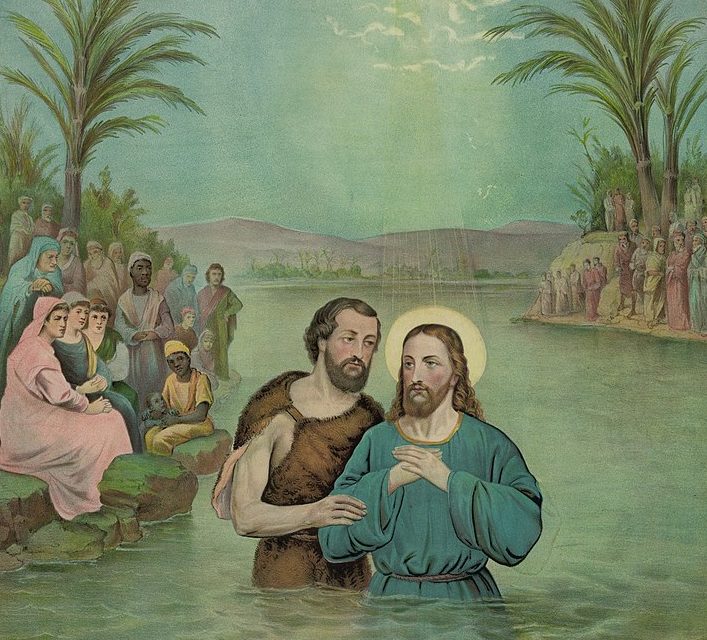Baptism is a curious and maybe misunderstood ordinance. The New Testament is not the clear on the purpose and meaning of water baptism. I’m not sure how the sprinkling of babies as baptism even came about. Perhaps, knowing that a baby could not be submerged in the water was one reason. And baptism became the one important saving ordinance, as typified in this scene from Life with Father:
What is the purpose of baptism? Life with Father portrays one point of view. I love his opinion and the thunder’s response. His wife is shocked and concerned that he was never baptized. But, really, what does it mean to be baptized? Is it that magical that if you are baptized you are saved? And if you are not baptized you go to hell?
Baptism is an important ordinance, but water baptism does not remove sin. I realize that many think that you repent and then get baptized, and that the water removes the sin, and you come up all clean and pure. Actually, the Lord cleanses you of your sins in the baptism of fire, not the water. So what is the baptism of water?
The Book of Mormon and Baptism
The Book of Mormon gives us more information about baptism. Nephi poses the question — How did Jesus fulfill all righteousness by being baptized by water? Why was Jesus baptized in water if he was holy (without sin)? Was it just to set an example?
Know ye not that he was holy? But notwithstanding he being holy, he showeth unto the children of men that, according to the flesh he humbleth himself before the Father, and witnesseth unto the Father that he would be obedient unto him in keeping his commandments. (2 Nephi 31:7)
Jesus was baptized in water by John, not to become clean of his sins, and not just as an example for us. He chose to be baptized as a witness to God the Father that he would keep His Commandments. It was an act of humility. And it was a witness to God the Father. It sort of reminds me of the vassal king relationship — the vassal bowing down before the king, promises to keep his law, and the king agreeing to protect the vassal. Baptism by water is a covenant between you and God. Jesus also made that covenant.
Nephi explains further, that Jesus says we should follow him. Nephi asks, “wherefore, my beloved brethren, can we follow Jesus save we shall be willing to keep the commandments of the Father” (2 Nephi 31:10)
The baptism in water is your physical witness to the Father that you are willing to keep His commandments. How does repentance tie into to this? “And the Father said: Repent ye, repent ye, and be baptized in the name of my Beloved Son” (2 Nephi 31:11) — which indicates that by repenting, you are sincere about “being willing to keep the commandments of the Father.” Repentance and keeping the commandments go hand in hand, because we are always in need of repenting in our journey of following Christ.
And then you witness to the Father that you are on this path by being baptized in the name of Christ. This is when it is kind of like a marriage, in the sense that as a woman/bride you take a new name — the last name of your spouse — or Christ in this instance. You are called by His name now — I guess you could say you become one of Christ’s — a Christian. It’s like changing your last name when you get married (for a woman). And you make promises to each other.
Baptism brings you into Christ’s church, “and they were called the church of God, or the church of Christ, from that time forward. And it came to pass that whosoever was baptized by the power and authority of God was added to his church.” (Mosiah 18:17) Taking the name of Christ and becoming part of His church is similar to the protection of the vassal-king relationship and covenant.
Baptism is a Witness and a Covenant
Alma explains that the purpose of baptism is a witness and a covenant, when he reaches out to the people,
…if this be the desire of your hearts, what have you against being baptized in the name of the Lord, as a witness before him that ye have entered into a covenant with him, that ye will serve him and keep his commandments, that he may pour out his Spirit more abundantly upon you? (Mosiah 18: 10)
…come and go forth, and show unto your God that ye are willing to repent of your sins and enter into a covenant with him to keep his commandments, and witness it unto him this day by going into the waters of baptism. (Alma 7:15).
When Alma baptizes Helam, he says it is a testimony that he (Helam) has entered a covenant to serve God until he dies:
Helam, I baptize thee, having authority from the Almighty God, as a testimony that ye have entered into a covenant to serve him until you are dead as to the mortal body; (Mosiah 18:13)
The baptism of water is not the washing away of your sins. It is a covenant between you and God that you are repenting and you are willing to keep His commandments. This is the gate. The cleansing of sin comes from the baptism of fire and the Holy Ghost.
And also, the voice of the Son came unto me, saying: He that is baptized in my name, to him will the Father give the Holy Ghost, like unto me; wherefore, follow me, and do the things which ye have seen me do. (2 Nephi 31:12)
The Father gives the gift of the Holy Ghost/the baptism of fire. Then you are cleansed of sin:
For the gate by which ye should enter is repentance and baptism by water; and then cometh a remission of your sins by fire and by the Holy Ghost. (2 Nephi 31: 17) See also (2 Nephi 31: 13)
I realize that when you desire to keep the commandments, you are also trying to clean up your life — which includes repenting of your sins. However, remember that Christ had no need of repenting, as Nephi stated. And what about 8-year olds? They are supposedly sinless before the age of accountability and saved in the Kingdom of God. They would have no need to repent before baptism at age eight. And if you were unaware of the commandments of God before learning of them, and then you have a desire to keep the commandments, I am not sure you can repent for something that you did not know was a sin. Anyway, the baptismal covenant is about witnessing before God that you have a desire to obey Him, and if you have sinned knowingly, it would include repenting. Of course, we always have need to repent, even after baptism. I think that’s why the baptism of fire often takes a little longer to receive – God needs to try us and we need to repent. It really makes no sense for a sinless 8-year old to be baptized with fire for a remission of sins when he/she has not been accountable for sin. Also, there is a greater responsibility after your baptism of fire —
But, behold, my beloved brethren, thus came the voice of the Son unto me, saying: After ye have repented of your sins, and witnessed unto the Father that ye are willing to keep my commandments, by the baptism of water, and have received the baptism of fire and of the Holy Ghost, and can speak with a new tongue, yea, even with the tongue of angels, and after this should deny me, it would have been better for you that ye had not known me. (2 Nephi 31: 14)
The New Testament and Baptism
The New Testament is not as pure a record as the Book of Mormon. It has passed through many hands, and thus the wording and meanings may have been altered. In fact it is not very clear what is meant in the Gospel of Mark: “And so John the Baptist appeared in the wilderness, preaching a baptism of repentance for the forgiveness of sins.”(Mark 1:4).
The Gospel of Luke seems to say much the same: “He went into all the country around the Jordan, preaching a baptism of repentance for the forgiveness of sins.” (Luke 3:3)
Peter talks about baptism. He explains how Noah and his family were saved through water — and then refers to baptism — “this water symbolizes baptism that now saves you also–not the removal of dirt from the body but the pledge of a clear conscience toward God. It saves you by the resurrection of Jesus Christ,” (1 Peter 3:21)
The “pledge of a clear conscience” seems to refer to having repented of your sins, and then making a pledge — which could resemble making a promise or covenant with God.




